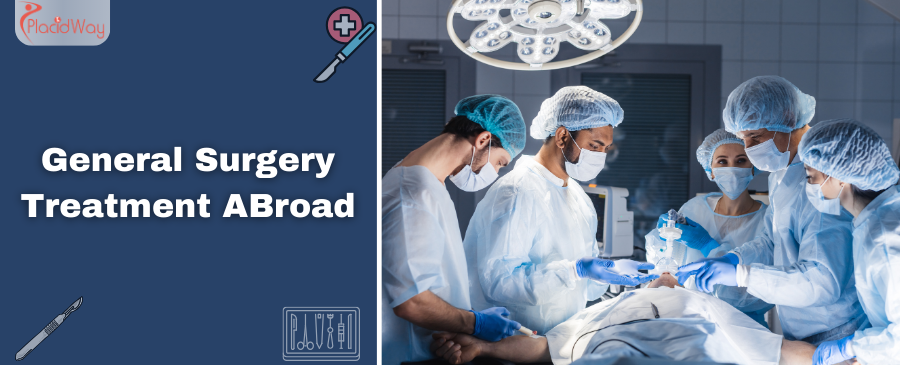
Finding Exceptional General Surgery Care Beyond Borders
Considering a surgical procedure can be a big decision, especially when it involves something as critical as General Surgery. This broad medical field addresses a variety of common yet vital conditions, from repairing a hernia to removing an appendix. If you're exploring options for essential operations, you might be surprised to learn that quality, affordable care isn't always found in your backyard.
General surgery is a specialty focusing on abdominal contents including the esophagus, stomach, small bowel, colon, liver, pancreas, gallbladder, and bile ducts, as well as the thyroid gland. It also deals with diseases involving the skin, breast, soft tissue, and hernias. Procedures range from life-saving emergency interventions to planned operations that significantly improve quality of life. The need for such surgery can arise from various health issues, including acute conditions like appendicitis or chronic problems such as gallstones.
For many, the increasing costs and lengthy wait times for general surgery in their home countries make international medical travel an appealing alternative. Medical tourism for general surgery offers a pathway to high-quality treatment, often at a fraction of the cost, without compromising on safety or expertise. By choosing to travel for your general surgery needs, you can access world-class facilities and experienced surgeons, ensuring you receive the care you need when you need it.
This comprehensive guide will walk you through everything you need to know about seeking general surgery abroad, from understanding common procedures and eligibility to navigating cost comparisons and planning your medical journey. We aim to answer your most pressing questions, helping you make an informed decision about your health and well-being.
Why Travel Abroad for General Surgery Procedures?
The decision to undergo general surgery is weighty, and where you choose to have it done can have a major impact. For many patients, international medical travel has emerged as a compelling option. The primary drivers are often the stark difference in costs, access to immediate care without long waiting lists, and the availability of advanced medical technologies and highly skilled surgeons.
Imagine needing a hernia repair that would cost tens of thousands in your home country, but finding an equally reputable clinic abroad offering the same procedure for a fraction of the price. This financial incentive is undeniable. Beyond cost, countries specializing in medical tourism often boast state-of-the-art hospitals with international accreditations, ensuring high standards of patient care and safety. Patients also appreciate the enhanced privacy and personalized attention they often receive in these medical tourism destinations.
What Are the Most Common Types of General Surgery Performed?
General surgeons are incredibly versatile, performing operations for a variety of conditions affecting numerous body systems. Understanding the types of procedures can help you identify if medical tourism is suitable for your specific needs:
- Hernia Repair: A very common procedure to fix a hernia, where an organ pushes through an opening in the muscle or tissue that holds it in place. This can occur in the groin (inguinal hernia), naval (umbilical hernia), or at a previous incision site (incisional hernia). Techniques range from open surgery with mesh reinforcement to laparoscopic repair, offering faster recovery times.
- Appendectomy: The surgical removal of the appendix, typically performed as an emergency procedure for appendicitis (inflammation of the appendix). This is often done laparoscopically, involving small incisions, less pain, and quicker recovery.
- Cholecystectomy (Gallbladder Removal): The removal of the gallbladder, usually due to gallstones causing pain, inflammation (cholecystitis), or other complications. This is overwhelmingly performed laparoscopically, allowing most patients to go home the same day or the next.
- Thyroidectomy: The surgical removal of all or part of the thyroid gland, often for thyroid cancer, goiter (enlarged thyroid), or hyperthyroidism (overactive thyroid).
- Breast Biopsy/Lumpectomy: Procedures to diagnose or remove breast lumps. While not always general surgery, it often falls under this specialty, especially for initial diagnosis or smaller excisions.
- Gastrointestinal Surgeries: Including procedures for stomach ulcers, diverticulitis, and various bowel resections for conditions like Crohn's disease, ulcerative colitis, or tumors.
Many of these procedures are now performed using minimally invasive laparoscopic techniques, which involve smaller incisions, less pain, shorter hospital stays, and quicker overall recovery compared to traditional open surgery. This advancement has made medical travel even more attractive, as patients can often return home sooner after their procedure.
How to Find Reputable Hospitals for General Surgery Overseas?
The key to a successful medical journey abroad is diligent research. Start by looking for hospitals that hold international accreditations, such as those from the Joint Commission International (JCI). JCI accreditation signifies that a hospital meets stringent international standards for patient safety and quality of care, similar to those in leading Western countries. Other recognized accreditations or quality certifications are also positive indicators.
Beyond institutional accreditation, investigate the qualifications and experience of the general surgeons. Look for board certifications, specialized training, and a strong track record of successful outcomes for your specific procedure. Patient testimonials and reviews can offer valuable insights into the patient experience, the facility's professionalism, and the surgeon's skill. Finally, ensure the hospital offers clear communication channels, ideally with English-speaking staff, and provides transparent pricing and treatment plans upfront.
What Conditions Can Be Treated by a General Surgeon?
The scope of general surgery is indeed broad, covering many common ailments that require surgical intervention. General surgeons are often the first point of contact for surgical issues related to:
- Digestive System: Conditions like appendicitis, gallstones, diverticulitis, various types of hernias, acid reflux (GERD), and certain gastrointestinal cancers (e.g., colon, stomach).
- Endocrine System: Surgical treatment for thyroid nodules, goiters, hyperthyroidism, and parathyroid gland issues.
- Skin and Soft Tissues: Removal of lumps, cysts, lipomas, moles, and treatment of skin infections or abscesses. They also manage complex wound care.
- Breast: Diagnosis and surgical treatment of breast cancer (lumpectomy, mastectomy) and benign breast conditions.
Essentially, if a condition requires an operation on any of these body parts, a general surgeon is typically the specialist consulted. They are often involved in emergency surgeries but also manage elective procedures that improve long-term health and quality of life.
Is General Surgery Abroad Safe and Reliable?
The safety and reliability of general surgery abroad depend heavily on your choices and research. High-quality medical tourism destinations invest heavily in modern infrastructure, advanced medical technology, and highly trained medical professionals. Many clinics and hospitals catering to international patients actively seek international accreditations (like JCI) to demonstrate their commitment to global standards.
Furthermore, surgeons in these facilities often have international training and experience, working with diverse patient populations. It's crucial to verify these credentials. While risks are inherent in any surgical procedure, choosing a reputable provider abroad with a proven track record can offer outcomes comparable to, or even exceeding, those in your home country. Patient safety protocols, advanced surgical techniques, and comprehensive post-operative care are hallmarks of reliable international general surgery programs.
What is the Cost Comparison of General Surgery Around the World?
One of the most compelling reasons to consider general surgery abroad is the dramatic cost savings. These differences stem from lower operational costs, differing medical liability laws, and varying economic structures in different countries. Here’s a general comparison for common general surgery procedures:
| Procedure | USA (Approx.) | UK/Canada (Approx.) | Mexico/Turkey/India (Approx.) |
|---|---|---|---|
| Laparoscopic Hernia Repair | $7,000 - $15,000 | $5,000 - $10,000 | $2,000 - $5,000 |
| Laparoscopic Appendectomy | $10,000 - $25,000 | $8,000 - $15,000 | $3,000 - $6,000 |
| Laparoscopic Cholecystectomy (Gallbladder Removal) | $15,000 - $30,000 | $10,000 - $20,000 | $4,000 - $8,000 |
| Thyroidectomy | $12,000 - $28,000 | $9,000 - $18,000 | $3,500 - $7,000 |
These figures are estimates and can vary based on the specific hospital, surgeon's fees, type of anesthesia, length of stay, and any additional services. However, they clearly illustrate the potential for substantial savings when opting for general surgery abroad.
Who is an Ideal Candidate for Undergoing General Surgery?
Eligibility for general surgery is determined by a thorough medical evaluation. Generally, a good candidate is someone who:
- Has a clear medical necessity for the procedure, confirmed by diagnostic tests (e.g., imaging, lab work).
- Is in reasonable overall health. While general surgery can address various conditions, patients with uncontrolled chronic diseases (like severe heart disease, uncontrolled diabetes, or severe respiratory issues) may face higher surgical risks.
- Does not have significant contraindications for anesthesia or surgery.
- Is mentally and emotionally prepared for the surgical process, including understanding potential risks and committed to following post-operative instructions.
It's vital to have a comprehensive pre-operative assessment with your surgeon, which includes reviewing your medical history, current medications, and lifestyle. This assessment ensures that the benefits of the surgery outweigh the potential risks and helps tailor the surgical plan to your individual health profile.
What Preparations Are Needed Before General Surgery?
Proper preparation is key to a smooth surgical experience and recovery. Your surgeon will provide specific instructions, but common pre-operative steps include:
- Medical Evaluation: This might involve blood tests, urine tests, an electrocardiogram (ECG), chest X-ray, or other imaging, depending on the procedure and your health.
- Medication Review: You may be instructed to stop certain medications, especially blood thinners, a week or two before surgery. Always consult your doctor before making any changes to your medication regimen.
- Fasting: Typically, you will need to fast (no food or drink) for a certain number of hours before surgery to prevent complications with anesthesia.
- Lifestyle Adjustments: Quitting smoking and reducing alcohol consumption can significantly improve healing and reduce complications.
- Hygiene: You might be asked to shower with an antiseptic soap the night before or the morning of surgery.
- Arranging Support: Plan for someone to drive you home after surgery and assist you during the initial recovery period. For medical tourists, this often means ensuring your travel companion is well-informed and prepared.
Following these instructions meticulously is paramount for your safety and the success of the general surgery procedure.
What Does Recovery From General Surgery Typically Involve?
Recovery is a crucial phase of any general surgery. The duration and intensity of recovery depend largely on the specific procedure performed, whether it was open or laparoscopic, and individual patient factors. Here's what you can generally expect:
- Pain Management: You will likely experience some pain or discomfort, which will be managed with prescribed medications.
- Activity Restrictions: Surgeons typically advise against heavy lifting, strenuous exercise, and certain movements for several weeks to prevent complications like hernias or wound dehiscence.
- Wound Care: Instructions will be given for caring for your incision sites to prevent infection and promote healing. This may involve keeping the area clean and dry or changing dressings.
- Dietary Changes: Depending on the surgery (especially gastrointestinal), you might be on a restricted diet initially, gradually progressing to normal foods.
- Follow-up Appointments: Regular check-ups with your surgeon are essential to monitor your healing process and address any concerns.
A full recovery can take anywhere from a few weeks to several months. Patience and adherence to your surgeon's post-operative instructions are vital for a successful outcome.
How Long Should I Plan to Stay in a Foreign Country After Surgery?
For medical tourists undergoing general surgery, planning your stay is as important as choosing your clinic. While recovery timelines vary, a common recommendation is to remain in the foreign country for at least 1-2 weeks post-surgery. This allows sufficient time for:
- Initial Hospital Stay: 1-3 days, depending on the complexity of the procedure.
- Local Recovery: Several days to a week in a nearby hotel or recovery facility, allowing you to rest and heal in a comfortable environment.
- Follow-up Appointments: Typically, one or more follow-up consultations with your surgeon to check incision sites, remove stitches if necessary, and assess initial healing progress before you fly home.
Flying too soon after surgery can increase risks like deep vein thrombosis (DVT) or complications with incisions due to changes in air pressure. Your surgeon will provide specific advice on when it's safe for you to travel, ensuring your journey home is as safe and comfortable as possible.
What Are the Potential Risks and Complications of General Surgery?
While general surgery is generally safe, it's essential to be aware of the potential risks and complications, similar to any surgical procedure. These can include:
- Infection: At the incision site or internally.
- Bleeding: Both during and after surgery.
- Adverse Reaction to Anesthesia: Ranging from mild nausea to more severe allergic reactions.
- Blood Clots: Particularly deep vein thrombosis (DVT) in the legs, which can travel to the lungs (pulmonary embolism).
- Damage to Surrounding Organs: Though rare, surgical instruments can inadvertently cause injury to nearby tissues or organs.
- Scarring: All incisions will leave a scar, though minimally invasive techniques result in smaller, less noticeable ones.
- Wound Complications: Such as dehiscence (wound opening) or delayed healing.
Your surgical team will take extensive measures to minimize these risks, but open communication with your surgeon about any concerns or symptoms during recovery is crucial. Choosing an experienced surgeon and accredited facility significantly reduces the likelihood of complications.
How Can PlacidWay Assist with Your General Surgery Medical Journey?
Navigating the world of medical tourism can seem daunting, but that's where PlacidWay steps in. We act as your trusted partner, streamlining every aspect of your general surgery abroad journey. Our extensive network includes globally recognized hospitals and highly skilled general surgeons who specialize in a wide range of procedures. We meticulously vet these facilities to ensure they meet the highest standards of safety, quality, and patient care.
From helping you compare treatment options and costs across different countries to assisting with travel arrangements, accommodation, and even translation services, PlacidWay provides comprehensive support. We understand the nuances of international healthcare and are dedicated to empowering you with information and choices. Our goal is to make your medical travel experience for general surgery as smooth, affordable, and successful as possible, allowing you to focus solely on your recovery and well-being.
Take the Next Step with PlacidWay
Ready to find top-quality, affordable general surgery abroad? Your path to better health is just a click away. Explore PlacidWay’s network of world-class clinics, compare transparent pricing, and get a free, personalized quote for your general surgery procedure. Let us help you plan a seamless and successful medical travel experience. Start your health transformation today!






Share this listing